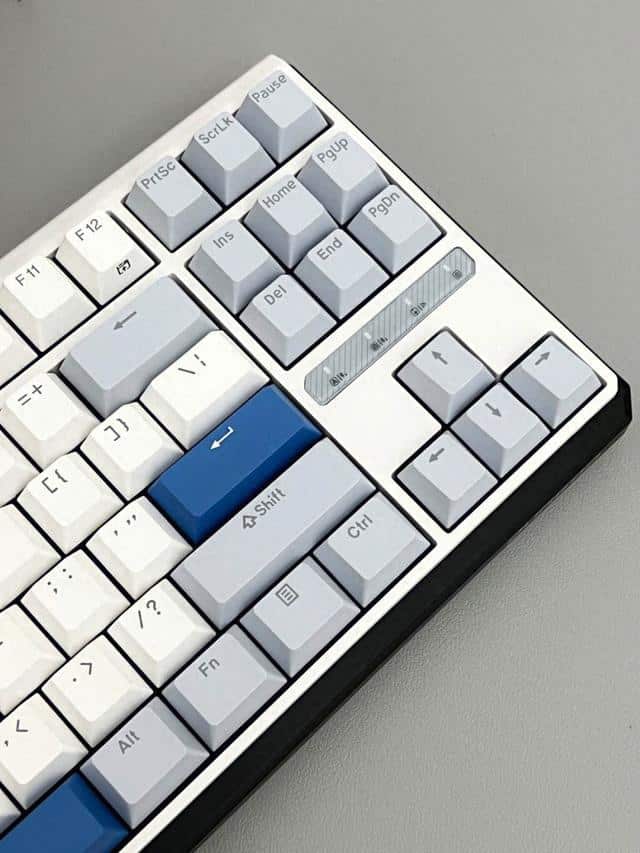Keyboards are essential computer peripherals. In the early years, computers and servers were mostly equipped with mechanical keyboards. Later, membrane keyboards replaced mechanical keyboards due to their cost-effectiveness. However, mechanical keyboards have never disappeared. They have always been regarded as high-end products, deeply loved by gamers and enthusiasts.
For some friends who haven’t used mechanical keyboards before, it’s difficult to understand what makes mechanical keyboards better. Today, let’s discuss in detail.
- Longevity
The lifespan of membrane keyboards is generally around 3 million keystrokes. Although they are inexpensive, they are prone to damage, especially some low-quality products, whose lifespan may be only a few thousand keystrokes.
The lifespan of mechanical keyboards depends on the mechanical switches they use. Different switches have significant differences in actual lifespan due to variations in craftsmanship, structure, materials, etc.

The lifespan of mechanical keyboard keys generally exceeds 30 million keystrokes, with official ratings for Cherry switches at 50 million keystrokes. Let’s take an example: suppose we type 2000 Chinese characters per day, with 4 keystrokes per character. That’s 8000 keystrokes per day, averaging 308 keystrokes per letter across the 26 letters. In a year, that’s about 180,000 keystrokes. If we reach the lifespan of 30 million keystrokes, it would take roughly 200 years, and if it’s 50 million keystrokes, it would take even longer.
In reality, due to different frequencies of keystrokes for each key, and considering the actual duration of use, it generally exceeds 20-30 years. Years ago, I used a vintage mechanical keyboard for nearly 10 years, and apart from the blurry letters on the keys, everything else was practically perfect.

- Good tactile feel
Due to the structure of membrane keyboards, they offer a uniform feel. The silicone material in the keyboard tends to degrade over time, resulting in a relatively fixed tactile feel, poor rebound, and even a mushy sensation.
With prolonged use of mechanical keyboards, the tactile feel remains consistent, with minimal changes in key response. The tactile feel varies among different types of mechanical switches. Each keystroke on a mechanical keyboard provides a noticeable rebound sensation, with clear and direct feedback. Therefore, typing becomes easy, comfortable, and noticeably efficient.

At least when I use a mechanical keyboard, my typing speed is significantly faster than with a regular membrane keyboard, and the error rate is extremely low.
- No conflict
Different parts of the mechanical keyboard are relatively independent, which is much better than membrane keyboards. Mechanical keyboards can achieve 6 keys or more without conflict, and even achieve full keyboard without conflict, while membrane keyboards that can achieve 6 keys or more without conflict are relatively rare.
- Strong playability
Different parts of the mechanical keyboard are relatively independent, so personalized adjustments can be made according to personal preferences. For example, changing keys, customizing function keys, etc., which is very important for some gamers.

- Pleasant Sound
When it comes to this, everyone may have different opinions. Some people think that the sound of each keystroke is crisp and pleasant, while others may find it very annoying. However, users generally enjoy it.
Having mentioned the advantages, let’s talk about the disadvantages. The biggest drawback of mechanical keyboards is that they are too expensive. Better mechanical keyboards cost over a thousand yuan, after all, they represent high-end products, so it’s normal for the cost to be higher. Moreover, considering the lifespan of mechanical keyboards, this price range is not actually high.
If the budget is not high, you can also choose products that cost only a few hundred yuan. I recently bought a mechanical keyboard for less than 200 yuan, and the typing experience is still good, worth having.
Additionally, the waterproof and dustproof capabilities of mechanical keyboards are relatively poor, so regular cleaning is necessary during use, and it’s important to avoid water to prevent damage to the keyboard.

Overall, mechanical keyboards are quite practical and suitable for most people to use, especially for gamers, frequent typists, and users who enjoy tinkering.
Friends who often type in the office should pay attention to choosing a keyboard with quieter switches, preferably ones with red switches. After all, loud sounds may disturb other colleagues (I was once criticized by colleagues and had to change my keyboard).
Gamers can choose keyboards with black switches, as these provide strong rebound force and are suitable for gamers who require speed without tactile feedback.
Keyboards with blue switches have a good tactile feel but produce louder sounds. Brown switches provide tactile feedback similar to black switches but with slightly softer sounds, making them suitable for beginners.
In general, mechanical keyboards offer excellent tactile feedback, strong compatibility, and customization options, making them the preferred choice for many consumers. When choosing a mechanical keyboard, you can select a product based on your specific needs.

